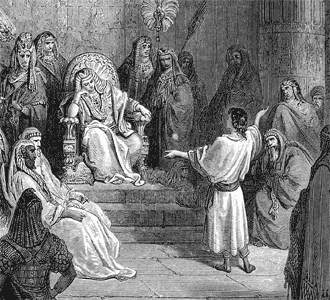Tuesday, July 25, 2006
Seated at the Right Hand of Power (Genesis 40-41)

Joseph’s story is simply amazing. Here he is, sitting in prison for a crime he didn’t commit – indeed, being punished because he didn’t commit the crime. Reflecting on when his brothers threw him into the cistern, Joseph laments, “I was indeed stolen out of the land of the Hebrews, and here also I have done nothing that they should put me into the pit.”
Then two servants of Pharaoh join him – the baker of bread and the server of wine. They both have troubling dreams which Joseph, the “dreamer” himself, is enabled to interpret by God. The cupbearer will again serve his master, but the baker will lifted up and hung on a tree – his body eaten as if it were bread. As presumptuous as it may seem, I can’t help but see Christological and Eucharistic foreshadowing here.
Anyway, Joseph finally gets his moment of glory when Pharaoh himself has troubling symbolic dreams. Joseph interprets them as predicting seven years of plenty followed by seven years of famine. Pharaoh is amazed, and places Joseph in charge of storing up food during the good years.
You almost want to wax poetic in the face of such grand exaltation following such dire suffering. Fortunately, there is a poem in Philippians that can be adapted nicely.
Joseph, though he possessed the promise of God, did not keep hold of the coat of his father, but was made nothing, being sold as a slave, taken to the land of Egypt. And being found in Potiphar’s house, he humbled himself by becoming obedient to the point of imprisonment, even in the dungeons of Egypt. Therefore God has highly exalted him and bestowed on him the name that is above all but Pharaoh, so that at the name of Joseph every knee should bow, in Egypt and in Canaan and in the far reaches of the Earth, and every mouth kiss the ground on his command, to the glory of God of Jacob.I know, I know – everything reminds me of Jesus. But reading the Old Testament as a Christian should be like reading a great mystery novel for the second time. You see so many clues pointing towards the solution to the puzzle: details that you simply missed the first time around. But now it all makes sense!
Anyway, Joesph’s plan works, and people from all over the world flock to Egypt for relief from the famine. This makes me reflect a little on the flood – of how the storing of food is like the storing away of the animals in the ark, so that when the destruction has taken its toll there will be resources to replenish the Earth. If Abraham’s trust and obedience corresponds to Adam’s suspicion and disobedience, and Esau’s reconciliation with Jacob corresponds with Cain’s murder of Abel, then maybe we should be reading the more biographical chapters (12-50) of Genesis as God’s initial reply to the opening mythological chapters (1-11).
Comments:
<< Home
The English major in me likes your parallels a lot. You could say that each of these biographical accounts illustrate God's work to redeem certain aspects of fallen creation... Adam had communed in the garden with God before he fell, and Abraham was a friend of God, giving hope that through this nation God would restore what Adam lost. Cain and Abel are a story of the breech in human relationships, and Jacob and Esau are eventually reconciled to some degree, so God begins to restore our human relationships through this nation he is raising up (which is perhaps why it was always so important to God that the Israelites refrain from attacking the Edomites). And though while Noah was a story of preparing for the coming distruction creation, Joseph is a story of preparing to save creation. In each case, God is using this new nation he is raising up to touch a fundamental place that the Fall has corrupted.
Reading the Old Testament typologically? Excellent! It's just a matter of time before the waters of the Tiber start looking inviting ;-)
I need to go back and read Genesis through the lens of the New Testament--I'd never caught the baker and the wine server link before.
Post a Comment
I need to go back and read Genesis through the lens of the New Testament--I'd never caught the baker and the wine server link before.
<< Home
Home
Who is Oyarsa?
Contact Me
Blog the Bible
Recent Comments
Archives
- June 2006
- July 2006
- August 2006
- September 2006
- October 2006
- November 2006
- December 2006
- January 2007
- February 2007
- March 2007
- April 2007
- May 2007
- June 2007
- July 2007
- August 2007
- September 2007
- October 2007
- November 2007
- December 2007
- January 2008
- February 2008
- March 2008
- April 2008
- May 2008
- June 2008
- July 2008
- September 2008
- October 2008
- November 2008
- July 2009
- August 2009
- January 2010
- August 2010
Recommended Books

